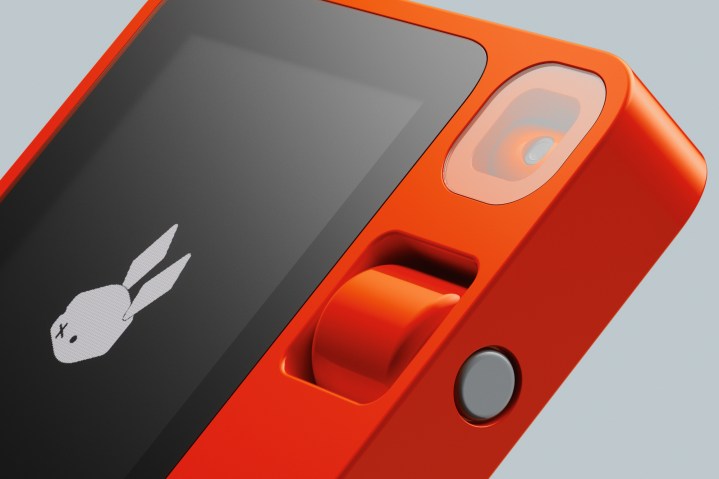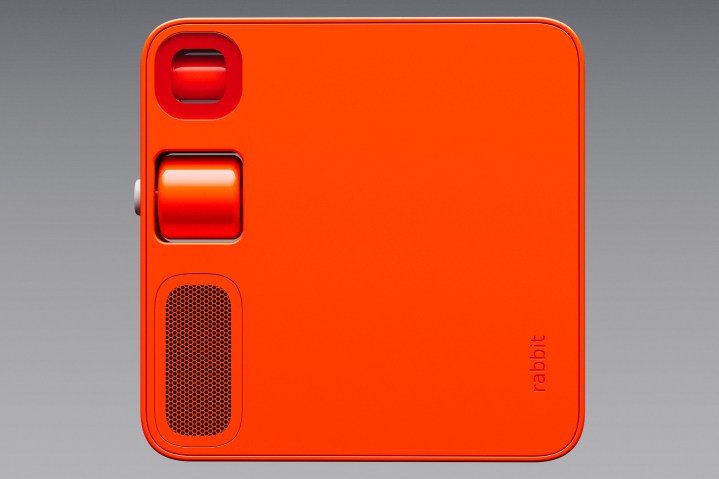
“Infer and model human actions on computer interfaces by learning users’ intention and behavior when they use specific apps, and then mimic and perform them both reliably and quickly.” That’s the promise of a rather cute, but cutting-edge device called the Rabbit R1, which was previewed at CES 2024. In simpler terms, it wants to keep us from getting lost in the maze of smartphone apps.
Instead, it wants to replicate human interactions with apps by learning and then removing them from the equation. And it can do it all without requiring a phone to pair with. Cellular connectivity is part of the package here, as is Wi-Fi, to execute AI-based tasks within apps without actually having to open those apps on your phone.
The idea is to build an app-free experience for human-machine interactions. Instead of tapping on your phone’s touchscreen, you let the device watch and learn and then execute the same task with voice commands in the future.
Imagine the Analogue Pocket gaming handset, remove the buttons, add a camera to it, and throw in some AI. When you do that, you get the Rabbit R1. The entire device weighs just 115 grams (nearly half that of an iPhone 15 Pro Max) and has been designed in collaboration with Teenage Engineering, the brand behind exquisitely crafted and outrageously expensive gadgets.
On the front is a 2.88-inch touch-sensitive display, a button you can press to talk with the machine à la the Humane AI Pin, and a 360-degree rotating camera ready for video calling. There’s also a scroll wheel that lets users quickly move between task cards on the screen. Rabbit is rather bullish on the package, claiming that the R1 can outpace flagship smartphones at executing tasks.
AI, apps, and replacing your smartphone

But design is just one-half of the picture here, as the R1 is all about AI. Instead of running a large language model (LLM) offered by the likes of Meta, the operating system powering the device relies on Rabbit’s in-house foundation model called Large Action Model (LAM) — and it’s the secret sauce behind all the device’s intelligent AI shenanigans.
The Los Angeles-based company says rabbit OS can understand what users want, work with screens and buttons, and perform tasks for the user — just like a helpful assistant. All you need to do is hold the device, bring it close to your mouth, and utter a voice command. The R1 is aimed at accomplishing this by learning a mobile app’s interface, saving it to a cloud-based platform, and then triggering the same task when a user utters the relevant voice command.

Tasks are handled by “rabbits” or AI agents. They will do what the likes of Alexa and Siri can’t. For example, they can make online travel bookings after thorough web research or load an online cart with groceries and pay for it. At launch, this learn-and-duplicate capability will be available for “most popular apps.” But the best part here is the potential for training flexibility.
Remember Siri Shortcuts and custom Android app routines? Well, Rabbit has an experimental feature in development that allows users to create a custom AI agent, aka “rabbit,” that will perform specific tasks in apps of their choice. MediaTek’s Helio P35 powers the Rabbit R1, assisted by 4GB of RAM and 128GB of onboard storage.

Focus on privacy
There’s a USB-C port for charging, while the battery is said to last a whole day. The company also makes bold claims about privacy. The R1 doesn’t store any login credentials. Let’s say you have Uber installed on your phone. The R1 will learn your task flow and then execute it with voice commands in the future, but your login identity will still be verified on Uber’s servers.
Users will also be able to delete all the data stored on them at their convenience and specify the tasks that can or can’t be deployed to the AI agents called “rabbits.” The R1 also puts a special emphasis on the world-facing privacy aspect. The R1 only starts listening once the physical button is pressed, while the camera defaults to gazing down.
For now, Rabbit R1 is only available in the U.S. and will be up for grabs from the company’s official website. Preorders are now live, and shipments are slated to kick off in March.
Editors' Recommendations
- I didn’t understand the Galaxy S24. Then I interviewed the person who made it
- How one company is giving your Wear OS smartwatch superpowers
- These are the weirdest mobile gadgets we’ve seen at CES 2024
- The app for your Garmin wearable is getting a huge overhaul
- Withings’ BeamO may be CES 2024’s coolest health gadget





